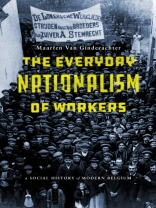The Everyday Nationalism of Workers upends common notions about how European nationalism is lived and experienced by ordinary people—and the bottom-up impact these everyday expressions of nationalism exert on institutionalized nationalism writ large. Drawing on sources from the major urban and working-class centers of Belgium, Maarten Van Ginderachter uncovers the everyday nationalism of the rank and file of the socialist Belgian Workers Party between 1880 and World War I, a period in which Europe experienced the concurrent rise of nationalism and socialism as mass movements.
Analyzing sources from—not just about—ordinary workers, Van Ginderachter reveals the limits of nation-building from above and the potential of agency from below. With a rich and diverse base of sources (including workers’ ‘propaganda pence’ ads that reveal a Twitter-like transcript of proletarian consciousness), the book shows all the complexity of socialist workers’ ambivalent engagement with nationhood, patriotism, ethnicity and language. By comparing the Belgian case with the rise of nationalism across Europe, Van Ginderachter sheds new light on how multilingual societies fared in the age of mass politics and ethnic nationalism.
Table des matières
Introduction: Workers into Belgians, Flemings and Walloons
1. A Socialist Pillar of a Hyperliberal State
2. Voting the Nation
3. Nationalist Celebrations and Mass Entertainment
4. An Anti-Militaristic State in Militaristic Times
5. The Royal and Colonial Paradox
6. Schooling the Nation
7. Encounters with the Belgian Flag and the National Anthem
8. Proletarian Tweets
9. Language, the Flemish Movement, and the Nation
Epilogue: The First World War
A propos de l’auteur
Maarten Van Ginderachter is Associate Professor of History at Antwerp University. He is the co-editor of
National Indifference and the History of Nationalism in Modern Europe (2019) and
Nationhood from Below: Europe in the Long Nineteenth Century (2012).












